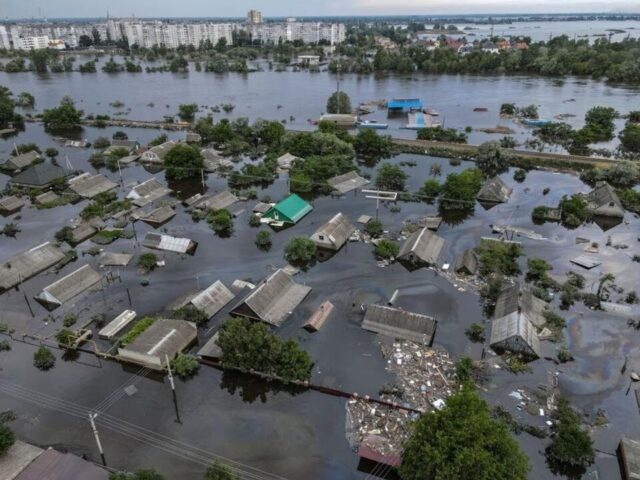The catastrophic flooding of Kherson city after the giant Kakhovka dam was destroyed is the latest chapter in more than a year of wartime suffering.
By Max Hunder
KHERSON, Ukraine – For Kherson resident Iryna Radetska, the catastrophic flooding of her city after the giant Kakhovka dam was destroyed is the latest chapter in more than a year of wartime suffering.
“They say a new love kills the old one. Maybe it’s the same with tragedy,” said 52-year-old Radetska, who is deputy head of a school in the southern Ukrainian city.
Few places have felt the extent of suffering that Kherson has since Russia invaded Ukraine in February last year. Few people bore the brunt of it harder than Radetska, who said she has survived imprisonment, beatings and rockets.
The city, which had a peacetime population of 280,000, was occupied by Russian forces on March 2, 2022. It was liberated by Ukrainian troops in early November, but since then has been regularly shelled by Russian forces from the east side of the Dnipro River.
In the latest setback, large areas of Kherson and villages nearby were submerged last week after the Kakhovka dam, 55km upstream, was destroyed. Kyiv and Moscow have blamed each other for causing the damage.
These days, Radetska’s school teaches only online due to the risk of shelling. Pupils include 31 on the Russian-held east bank that was particularly badly hit by the floods, including the town of Oleshky.
“As far as we know, Oleshky was flooded … the mobile connection there is very bad. They are very limited in their movements. Then there is the psychological question,” she told Reuters, referring to people’s trauma.
HORRORS OF OCCUPATION
Leonid Remyha, chief doctor of one of Kherson’s hospitals, recalled the huge flow of people into the facility after the dam burst on Monday. They were wet and upset. “On the first day we admitted 136 people … they were all in a state of stress.”
The past week’s events have been a fresh tragedy for Radetska and Remyha, who both recounted threats, imprisonment and torture during Russia’s occupation.
Reuters could not independently verify their accounts of ill treatment. Moscow has repeatedly denied abuse of civilians or soldiers.
Remyha, who is 69, said Russia’s military ordered the hospital to treat its soldiers “under the barrel of a gun”.
He said the hospital’s staff took risks to give illicit assistance to local Ukrainian soldiers left in the city after the occupation.
“We gave them care, we registered them under fake names and surnames so that the FSB wouldn’t catch them,” he recalled, referring to Russia’s security service. “We snuck them out of the hospitals so the local population could take them away and shelter them.”
Remya said that after being fired for his pro-Ukrainian stance, he hid for six weeks but was detained by the FSB on Sept. 20.
“There were interrogations every day, twice. This was all accompanied by abuse … for instance electric shocks, baton (strikes) on the ribs, legs, knees and fingers,” he said.
According to Remyha, on the third day of captivity the Russians discovered he was a doctor, and their treatment of him improved slightly. He was released after 10 days.
Radetska also recounted imprisonment and torture under occupation. Over the summer of 2022, she said she turned down offers to return to work at her school.
When she went to the school on August 17 to collect her belongings, she had an argument with the new headmaster, which led to her arrest the next day by FSB officers who told her she faced 25 years in jail on terrorism charges.
“The cell was meant for two people but there were seven of us there,” she said. “There were two narrow beds and everyone else slept on the floor.”
Remyha said she was beaten, causing spinal injuries she is still recovering from. She added that she was released after nine days, having been given the choice of recording a video apologising for her actions or execution.
Russia’s FSB did not immediately respond when asked to comment on to the allegations made by Remyha and Radetska.
Reuters has previously reported on alleged torture and abuse by Russian authorities in Kherson.
Moscow has rejected allegations of abuse against civilians and soldiers in Ukraine and has accused Ukrainian authorities of staging such abuses in places like Bucha, something which Kyiv dismisses as a lie.
LIBERATION AND SHELLING
Kherson’s liberation triggered jubilation from many residents, including Radetska and Remyha. But the euphoria was short-lived given the artillery and rocket fire from across the Dnipro that began to hit the city almost daily.
Radetska said her school had been hit several times, including the day before the dam burst.
“We hadn’t even had time to process this, and get used to this thought (of the school being bombed) when another tragedy struck.”
“Today, we probably don’t have a single family that hasn’t faced the consequences of war whether it’s death, destruction or fear. People have become different. Children have become noticeably different; they’ve become more grown up.”
Like many residents who remain, Radetska is convinced the city will recover and thrive, but she said she expects the process to be long and difficult.
Of the approximately 1,400 children registered at her school, just over 100 are still in Kherson region. The rest are in other regions of Ukraine or abroad.
Remyha said just over half of his hospital staff of around 1,200 before the invasion remained. Of the entire workforce, only 12 fled to Russian-controlled areas when Ukrainian forces returned.
“We have to show the entire world and ourselves that Kherson is a city of freedom-loving people, and despite everything that’s happened, we will definitely survive here,” he said.
– REUTERS








